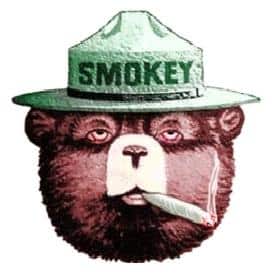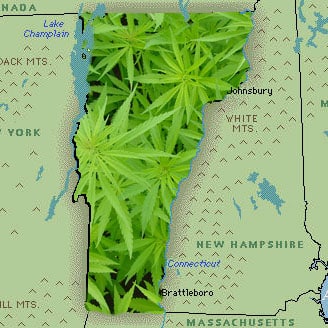 I received this from Drug Policy Forum of California:
I received this from Drug Policy Forum of California:
Vermont’s new law allows a patient to grow two mature and/or seven immature plants only in a “secure indoor facility.” Patients can posses only 2 oz. of “usable marijuana” (including leaf) along with their plants.
[Arizona law allows cultivation only if the patient lives beyond a 25-mile radius of a dispensary. Patients (or their primary caregivers) may legally possess no more than two and one-half ounces of usable marijuana, and may cultivate no more than twelve marijuana plants in an “enclosed, locked facility.” https://www.norml.org/index.cfm?Group_ID=3391#Arizona]
In Vermont, patients must register for a $50 yearly fee with the name of their dispensary, and may only join one of the four allowed under the new law. Physicians must sign A statement that reasonable medical efforts have been made over a reasonable amount of time without success to relieve the symptoms. Law nforcement can still seize patients’ medicine and paraphernalia without returning it.
Their law https://www.leg.state.vt.us/docs/2012/bills/Passed/S-017.pdf defines:
“Mature marijuana plant” means a female marijuana plant that has flowered and which has buds that may be observed by visual examination.
“Possession limit” means the amount of marijuana collectively possessed between the registered patient and the patient’s registered caregiver which is no more than two mature marijuana plants, seven immature plants, and two ounces of usable marijuana.
“Usable marijuana” means the dried leaves and flowers of marijuana, and any mixture or preparation thereof, and does not include the seeds, stalks, and roots of the plant.
“Secure indoor facility” means a building or room equipped with locks or other security devices that permit access only by a registered caregiver or, registered patient, or a principal officer or employee of a dispensary.
A caregiver will serve as the registered caregiver for one registered patient only; and (2) the person has never been convicted of a drug-related crime. (They will check with FBI, etc. for dispensary operators also.)
A law enforcement officer shall not be required to return marijuana or paraphernalia relating to its use, marijuana-infused products, and marijuana-related supplies seized from a registered patient or registered caregiver. However, if marijuana or marijuana-infused products are seized by a law enforcement officer and if there is a subsequent determination that the patient or caregiver was in compliance with this subchapter, the seized marijuana and marijuana-infused products shall not count toward the possession limits or dispensary allocation set forth in this subchapter for the patient or caregiver.
A registered patient or registered caregiver who elects to grow marijuana to be used for symptom relief by the patient may do so only if the marijuana is cultivated in a single, secure indoor facility.
A registered patient or registered caregiver may not transport marijuana in public unless it is secured in a locked container.
Within 72 hours after the death of a registered patient, the patient’s registered caregiver shall return to the department of public safety for disposal any marijuana or marijuana plants in the possession of the patient or registered caregiver at the time of the patient’s death. If the patient did not have a registered caregiver,
the patient’s next of kin shall contact the department of public safety within 72 hours after the patient’s death and shall ask the department to retrieve such marijuana and marijuana plants for disposal.
In response to a person-specific or property-specific inquiry by a law enforcement officer or agency made in the course of a bona fide investigation or prosecution, the department may verify the identities and registered property addresses of the registered patient and the patient’s registered caregiver, a dispensary, and the principal officer, the board members, or the employees of a dispensary. [It does say the records will be protected otherwise; a 24-hour database with identification numbers will be established.]
A dispensary shall be operated on a nonprofit basis for the mutual benefit of its patients but need not be recognized as a tax-exempt organization by the Internal Revenue Service.
A dispensary shall have a sliding-scale fee system that takes into account a registered patient’s ability to pay.
A dispensary shall not be located within 1,000 feet of the property line of a preexisting public or private school or licensed or regulated child care facility.
A dispensary shall destroy or dispose of marijuana, marijuana-infused products, clones, seeds, parts of marijuana that are not usable for symptom relief or are beyond the possession limits provided by this
subchapter, and marijuana-related supplies only in a manner approved by rules adopted by the department of public safety.










